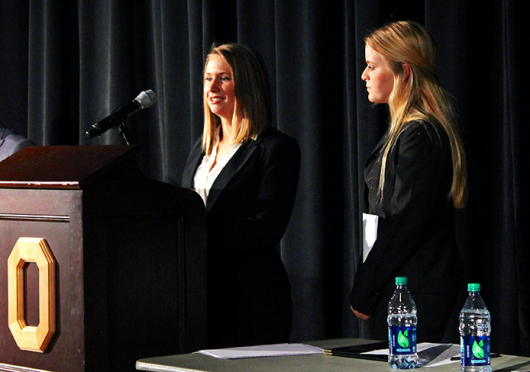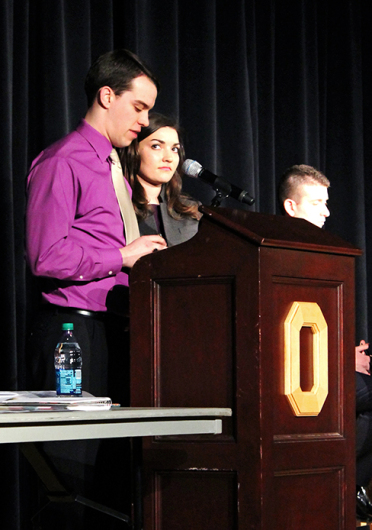
Vice presidential candidate Abby Waidelich (left), a third-year in biological engineering, speaks to a crowd of OSU students with presidential candidate Abby Grossman, a third-year in education, during to the USG candidate debate March 2 at the Ohio Union. Credit: AJ King / Lantern photographer
The two Undergraduate Student Government presidential slates debated policy initiatives Monday night at the U.S Bank Conference Theater at the Ohio Union.
Michelle Bennett, a third-year in public affairs and chief of staff for USG, is running for president alongside vice-presidential candidate Noel Fisher, a third-year in political science and geography and off-campus senator and member of the health and safety committee at USG.
Bennett and Fisher will be running against presidential candidate Abby Grossman, a third-year in education and organizational outreach director for USG, and Abby Waidelich, a third-year in biological engineering and senior director of public relations for USG, who is running for vice president.
After a year that’s seen multiple robberies, sexual assaults and, most recently, a homicide, safety both on and off-campus was among the topics debated.
Team Abby discussed a four-point safety plan that includes mandatory safety training for incoming freshmen, enacting a Good Samaritan Law, increased lighting on Pearl Street and working to lower wait times at the Student Safety Service.
“We want to make sure we can relate to and connect to the average OSU student,” Grossman said. “We hope to bring not only alcohol education and ways to stay safe on the weekends, but also issues of sexual assault. We want to bring in survivors to these mandatory training classes in an attempt to show students what these crimes look like.”
Fisher said his team’s proposed safety model would not only eliminate wait times for Student Safety Service rides that can sometimes be up to three hours, but it will also create jobs.

Noel Fisher (left), a third-year in geography and political science, speaks to a crowd of OSU students with his running mate Michelle Bennett, a third-year public affairs major, during the USG candidate debate March 2 at the Ohio Union. Credit: AJ King / Lantern photographer
“Walking alone on and off campus poses many dangers,” Bennett said. “We see a need for increased rides from Student Safety Service. We are proposing a rideshare model similar to Uber where student drivers will be hired to use their private vehicles.”
Another issue raised was tuition affordability, specifically that of out-of-state students and international students.
“As an out-of-state student, I know firsthand the pains of those additional costs,” Fisher, who is from Kansas, said. “In-state students received a tuition freeze a couple years ago which is fantastic for in-state students, but out-of-state and international students now hold an added burden. We plan to work with officials to get tuition frozen for all students here at OSU.”
Waidelich said even though OSU has the lowest tuition in the Big Ten Conference, she thinks there is still room for improvement in regards to education costs.
“Students not only pay for tuition, but room and board, books, fees, involvement, travel and the overall cost of simply living in Columbus,” she said. “We need to not focus on one or two of these issues, but how to cut cost in all of these areas.”
One way to start this would be to implement a change to the current meal plan that would allow students to roll over unused blocks, which Waidelich said was a “no brainer” for both students and officials.
Another way to make attending OSU more affordable would be a partnership with an airline, which then could be used to give students discounted airfare, Grossman said.
“One area we want to make more affordable is travel,” Grossman said. “My roommate is unable to travel home for Thanksgiving due to the high cost of flights. That’s unacceptable, and we as a university need to do better.”
During her rebuttal, Bennett said she doesn’t think the airline partnership is feasible.
“We don’t have a huge metropolitan area and we don’t have any airlines that we could probably partner with,” Bennett said. “The only way this could possibly happen would be to increase student fees similar to that of the COTA fee that students would have to pay. An increased fee is just not going to fly.”
One member of the audience agreed about the importance of addressing affordability.
“The biggest thing, which I think both teams touched on, is that it’s not just tuition,” said Josh Ahart, a fifth-year in public affairs and former USG vice-president and 2014 presidential candidate. “It’s fees, it’s meal plans and I think both teams did a great job of emphasizing that tonight.”
One thing that was agreed on during the debate was the importance of each slate and team moving forward.
“On our slate, we have 40 unbelievable senators who would all do a fantastic job,” Waidelich said. “This university would be so blessed to have them elected into the general assembly. Just as they do with all the hard work they put into this campaign, they realize if elected, they will be responsible representatives and voice throughout the entire year.”
Fisher echoed those sentiments when speaking of his slate.
“We have an incredibly diverse and hardworking slate of senators and general members on our team,” Fisher said. “We are genuinely interested in hearing what everyone has to say and how they want our organization to run.”
After hearing comments from Bennett and Fisher regarding increased staffing for the Counseling and Consultation Service center and Team Abby discuss the importance of addressing eating disorders, Ahart said he was pleased.
“One thing that I was very proud to hear discussed was mental health awareness and reducing the stigma of mental health,” Ahart said. “It was really cool to hear that is something that is important to both platforms, as it was something we worked really hard on last year as well.”
USG voting will begin at noon on March 9 and conclude at 11:59 p.m. March 11. The ballot will be available at https://usg.osu.edu.


